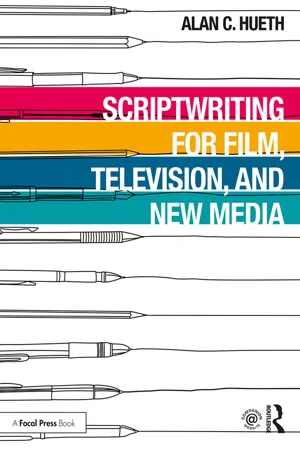
- 472 pages
- English
- ePUB (mobile friendly)
- Available on iOS & Android
Scriptwriting for Film, Television and New Media
About this book
What are the foundations of scriptwriting? Why do some scripts gain more prestige than others? How do you write a script and get it noticed? Scriptwriting for Film, Television and New Media answers these questions and more, offering a comprehensive introduction to writing scripts for film, television, the Internet, and interactive multimedia.
Author Alan C. Hueth explains not just how to write, but how to think and apply the fundamental principles of screenwriting to multiple platforms and genres. This includes chapters on numerous script formats, including drama and comedy in film and TV, short films, commercials and PSAs, news and sports, interview shows, documentaries, reality shows, and corporate and educational media, including interactive multimedia. This book also addresses legal and ethical issues, how to become a professional scriptwriter, and a section on production language that provides helpful explanations of how camera, locations, visual and audio effects combine on screen to engage and sustain viewer attention, and, consequently, how to improve scriptwriting technique.
The book features numerous case studies and detailed examples, including chapter by chapter exercises, plot diagrams, quick-look and learn tables that assist readers to quickly understand genre related script elements, and in-depth script close-ups to examine precisely how writers utilize the principles and elements of drama to create a successful script. It is also supported by a comprehensive companion website with further case studies, assignments, video clips, and examples of films and programs discussed in the book. Scriptwriting for Film, Television, and New Media is ideal for aspiring scriptwriters and anyone wanting to broaden their understanding of how successful scripts are created.
Frequently asked questions
- Essential is ideal for learners and professionals who enjoy exploring a wide range of subjects. Access the Essential Library with 800,000+ trusted titles and best-sellers across business, personal growth, and the humanities. Includes unlimited reading time and Standard Read Aloud voice.
- Complete: Perfect for advanced learners and researchers needing full, unrestricted access. Unlock 1.4M+ books across hundreds of subjects, including academic and specialized titles. The Complete Plan also includes advanced features like Premium Read Aloud and Research Assistant.
Please note we cannot support devices running on iOS 13 and Android 7 or earlier. Learn more about using the app.
Information
Section 1
Foundations
Prepping and packing for the journey
Chapter 1
Principles and elements of outstanding scriptwriting
- How to transport viewers on some amazing journeys
- How to do what’s most important: engage and sustain the audience’s attention
- How the principles of pleasure, emotion/pathos (pity), fear (suspense), conflict, character beats, plot points, and script unity are related to audience effect
- How the elements of drama are used to write outstanding scripts
- What to not do as a writer
Introduction
- Why is it that viewers care about the Katniss Everdeen character in The Hunger Games films?
- Why is viewer attention riveted to the screen when they see the totally funny Mayhem character in the Allstate commercials?
- Why do viewers care so much about what the boss – in the award-winning reality show, Undercover Boss – will do about an out-of-control employee or a needy employee who’s living in his or her car?
- Why do viewers return week-after-week to see what’s up in the lives of the characters of The Big Bang Theory?
- Why do viewers sit still to hear their favorite actor reveal their greatest secret on the television talk show after the commercial break?
- Why do viewers sit through documentaries to really get to know the famous person or find out the real killer or understand a big issue?
- Why do viewers watch and begin to care about the history or goals or how-tos of their job with their new employer in an informational or training video?
- Most films that are made don’t make a profit.
- Most TV shows don’t last longer than one year!
Program purpose: reach the destination
- Definition: pleasure – a positive feeling that comes when we see aspects of ourselves and others imitated on the stage.
Pathos
- Definition: dystopian – an imaginary totalitarian place where settings and environments, technology, and people are degraded and without hope of improvement.
- Definition: pity – a feeling that involves an increasing interest and care for/about a character, topic, or issue being portrayed in a film or television program.
Pity: sympathy, empathy, and antipathy
- Definition: sympathy – when we feel someone’s pain or distress – based on a similar experience, or when we have a moderately strong agreement with something or someone.
Table of contents
- Cover
- Half Title
- Title
- Copyright
- Contents
- Acknowledgments
- Preface
- Introduction
- Section 1 Foundations: prepping and packing for the journey
- Section 2 Hitting the road: exploring program types
- Section 3 The rules of the road: ethics, law, and getting a professional start
- Index